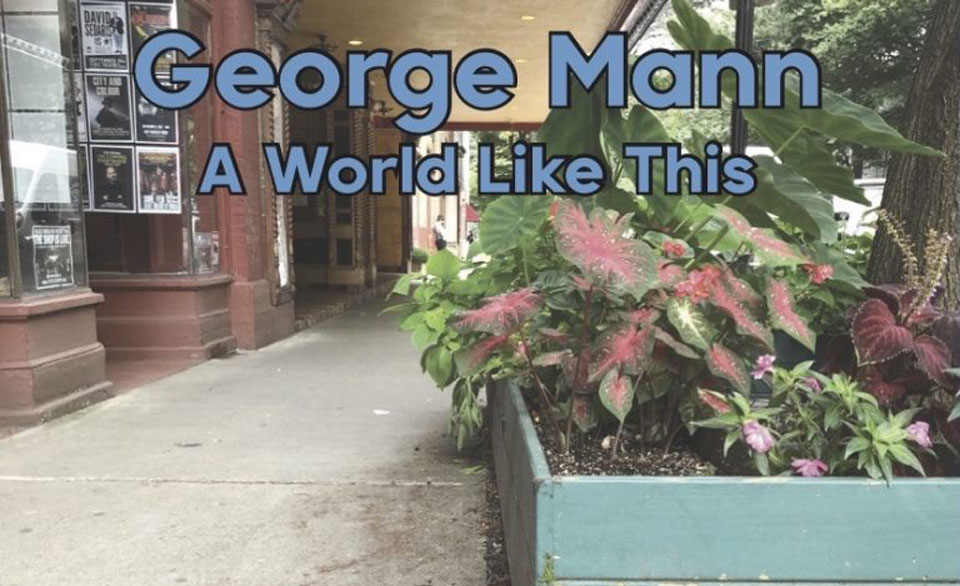
We last caught up with singer/songwriter George Mann a year ago when he released his CD The Coronavirus Sessions. In the midst of a worldwide pandemic whose outcome was uncertain at best, the album had an autumnal quality, or what I called “a wise, avuncular summing up,” almost as though conceived as the artist’s “final testament.” Now, I am both happy—and saddened—to report that George has a new album out, called A World Like This. Happy, of course, to know that George is still very much with us, composing and searching the American songbag for suitable titles to release in the here and now.
But I am saddened, too. The pandemic, alas now with its new variants, is still with us, despite the vaccines and the boosters. George hasn’t resumed his travels and concertizing and feels all cooped up at home, thankful at least for his loyal bandmates who have rejoined him on this production. But he’s still in that deep melancholy, haunted by death, what it means to pass on to the great beyond and what he, joining, uh, everyone else, will leave behind as his legacy. The last song on the album recalls some of the last songs recorded by such artists as Otis Redding, Hank Williams, and Janis Joplin, and now “it won’t be long” before I—the singer/songwriter—leave too. This last song is called “The Last Song.” It sounds like a farewell to the world, as though George is telegraphing his friends that his life is nearly over.
It’s a fair and reasonable response to the world to feel in a kind of downer mood, and an artist has the right, like anyone else, to feel what they feel. Death and loss are the subject for many and many a song, including by my count at least eight or nine out of the twelve tracks here. The CD title song is bleak and despairing, setting the tone: “Don’t wanna live in a world like this…there ain’t no fun in a world like this….”
Yet at the same time—this is an old question, naturally—doesn’t an artist also have a responsibility to shed light where possible, to offer hope, to encourage those who are still fighting the good fight?
Yes, there is some of that on the new album. George records a new take on Si Kahn’s “They All Sang Bread and Roses,” a piece of nostalgia for songs that inspired us in the 1960s. And though the song does refer to the struggles of later generations, who have their own anthems—a luta continua and all that— the other songs on this new CD barely take notice of anything working and oppressed people today are doing. What was the urgency at this time, on this album, of including “Long Black Veil?”
There are, to be sure, a couple of upbeat humorous numbers, principally “I Don’t Miss What’s-His-Name at All,” referring to You-Know-Who in a joyful jugband upbeat farewell jubilee. Maybe it will be adopted by the Democratic presidential campaign in 2024 when that So-and-So is on the opposing ticket again, the states are all gerrymandered and voter suppression’s in the saddle again!
One song, meant to be humorous, talks about a sleepy old Southern town in Georgia where they actually passed a law banning left-hand turns. “We don’t mind taking the long way home,” George sings, because “We Only Turn Right Around Here.” The GOP is trying to rig elections in many states, but “around here we do what we’re told and most of us like it that way.” This is what I mean about seeing only the dark side of life. The bright side is that owing to the incredible Stacey Abrams and her statewide activist followers, Georgia now has one of the highest voter registration numbers in the country, their hard work gave us two critical Democratic upsets in the Senate in 2020, and pushed the state into the blue column in the Electoral College!!!! (That’s one exclamation point for each of those amazing achievements.) They most emphatically did not “do what we’re told!” Yet all George sees with Georgia on his mind is a caricature of the Old South.
George has such a warm and soothing, unpretentious voice. It is a pleasure to hear it. He has a gift for the elegiac. It’s especially moving to hear his “Ballad of Julie M.,” which he wrote back in 1998, a tribute to his late musical comrade and muse, “it ain’t no sin to be called a red” Julius Margolin, veteran of labor struggles going back to the 1930s. This is one of the highpoints of the album. “Where are you when we need you?” the singer asks. Yes, many individuals are missed along the way, and righteously, but we do have so many other fine fighters for justice that we badly need and they are walking among us now!
With its tired, defeated mournfulness, this seems like an appropriate album to play early in the evening on New Year’s Eve as a necessary, maybe a cathartic thing to get out of one’s system before resolutely lurching back into the struggle in 2022, when we won’t have a lot of time to ruminate about whether this is our last reasonably democratic election or not.
In the meantime, I wish George good health and long life—and many more songs that lift our spirits.
Lyrics, videos, calendar, ordering information and more are available at George’s website.
100 years of American song
From Rags to Riches: 100 Years of American Song is the belated release of a live concert recording at the Kaye Playhouse at Hunter College in New York on March 23, 2000, that happily celebrated the fact that the U.S. survived Y2K! Featuring world-renowned opera singers Stephanie Blythe and William Burden, and with the brilliant collaboration of New York Festival of Song cofounder Steven Blier at the piano, that performance finds new life after resting in the archives for 22 years, on the first full album from the NYFOS Records.
I’ve followed NYFOS, mostly from afar, and actually was shocked to learn this is its first CD release. Their programming has been so exciting over the last three decades-plus, that I kind of assumed more of their work had found its way onto disc. To be honest, one reason their project has always excited me is that Blier and his cofounder Michael Barrett have long been advocates for the music of Marc Blitzstein, whose first biography (by yours truly) was published in 1989. So virtually everything they have done has been infused, in the spirit of Blitzstein, with the sense that music, song and story are intimately fused with a sensitive feel for the times and social conditions that inspired them.
If From Rags to Riches celebrates the last century as our new century began, with a compendium of 17 American songs, I wonder if with the economic and moral decline of the empire that we see now, the album for the century we’re living in now might be called “From Riches to Rags.”
Blier knows the American song repertoire as well as or maybe better than anyone in the country. The range of material that comprises these 17 numbers is stunning: Black, white, Jewish, immigrant, straight, gay, traditional, art song, rags (thus the title), Broadway, jazz, serious, comedic. Seventeen is a finite number, of course, and the 60-minute length is what it is, so some might feel the lack of certain representation: Native, Latinx, women composers, for example. On most numbers either Blythe or Burden owns the stage; on a few they sing together.
The 20th century is when formal American music really started on its own path liberated from European models. In large part that process of producing a truly American sound required more deeply acknowledging our native roots—Native in the sense of Indigenous peoples, and native in the recognition of folk song, Black spirituals and later minstrelsy, vaudeville, and many different streams in jazz. Many cultural historians point to jazz and the Broadway musical as the two most singular American contributions to world music. Both are well represented on this CD.
To this listener, the more strictly defined genre of art songs, included here in two numbers by Charles Griffes and Samuel Barber, are the least interesting, partly on account of their elevated, high-falutin’ literary texts, which by the way, even though English is the common language of all these songs, are difficult to understand as the CD includes no text booklet. Even in most of the other numbers too, with their lively piano accompaniments, the miking, the vernacular language, the operatic delivery in many cases, the audience response, the words are hard to grasp. Perhaps this could be corrected with a link to them on the NYFOS website. Some are searchable on the internet.
From the jazz spectrum we have the opening number, the “Pineapple Rag” by Scott Joplin, performed by Blythe in a bold, brassy voice that evokes the style of a Ma Rainey or a Bessie Smith. She modulates her tone with some half-sung, half-spoken passages. Even Blier refers to “Stephanie’s volcanic energy.” In this, as in some later numbers, the stentorian delivery of Ethel Merman comes to mind. Probably in the concert hall, the big operatic quality of this voice, joined to movement, gesture and expression, dress, lighting, acoustics, and other ambient factors, might not stand out so prominently, but on a CD of song it does.
Other jazz-inspired numbers include “My Lady Frog” by Will Marion Cook (this one struck me as perhaps more vaudeville than jazz, but it does have an enchanting syncopated rock), that subtly addresses the theme of race; Eubie Blake’s “Hit the Road”; Leonard Bernstein’s delicious “Wrong Note Rag”; and Thelonius Monk’s “‘Round Midnight” in a stunning arrangement by Ricky Ian Gordon, in which Blythe brings out the softer, cooler, more conversational timbres of her powerful vocal instrument.
From Broadway we get the Gershwins’ “Oh Gee! Oh Joy!,” an ecstatic love duet; Blitzstein’s “Nickel Under the Foot” from The Cradle Will Rock, one of the great Depression-era songs, performed at first almost militaristically by Blythe, then turning more interior and interpretive; “Thousands of Miles” from Kurt Weill’s Lost in the Stars, derived from South African writer Alan Paton’s anti-apartheid novel Cry, the Beloved Country, which in the American context could refer to the Great Migration northward by millions of African-Americans or to the long, too long journey toward justice. Also from the world of Broadway, “Take the Moment” by Richard Rodgers; “The Ballad of Booth” about John Wilkes Booth, from the recently passed Stephen Sondheim’s Assassins, addressing the theme of political/pathological violence—a “legacy of butchery and treason”—which seems ever more embedded in American society.
And from other diverse sources, a feminist, Sondheim-inspired number by Jonathan Larson, “Hosing the Furniture” that is a kind of answer to “I Feel Pretty”; Blitzstein’s lovely, futile “Stay in My Arms,” a 1930s paean to coupling as romantic escape from the terrors of the world, which Burden delivers with heartbreaking sincerity; William Bolcom’s anthemic “New York Lights,” an immigrant’s mesmerizing tribute to a panorama never envisioned in his home country or anywhere else he’d ever seen, from the Arthur Miller-based opera A View from the Bridge; a haunting song by Chris de Blasio, to words by Perry Brass, “Walt Whitman in 1989,” honoring the good gray poet’s ministrations to Civil War casualties in Northern hospitals as he might today, embracing the dying bodies of so many of his comrades falling to AIDS. And starting with a mournful keening sound as if in response to the last number, David Krane’s superbly evocative, sometimes dissonant arrangement of Robert Wadsworth Lowry’s song, first published in 1868, in the immediate aftermath of the Civil War, that celebrates the human need for song under any and all conditions:
“When tyrants tremble in their fear/ And hear their death knell ringing,/ When friends rejoice both far and near/ How can I keep from singing?/ In prison cell and dungeon vile/ Our thoughts to them are winging,/ When friends by shame are undefiled/ How can I keep from singing?”
It’s almost as if the impulse to keep singing is what keeps us alive—and maybe it’s true.
If the CD had a program book with texts there would have been more room to properly identify the sources and backgrounds to these 17 songs and their composers, and to appreciate the depth of their lyrics. As presented, these riches seem a bit unmoored to history, yet chronologically and collectively, as they are meant to do, they summon up great vistas of the American experience, its problems, its approach and its resistance to resolving them, and the many rhythms and vocal registers of our life.
For more information about this CD and the New York Festival of Song, visit their website.












Comments